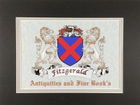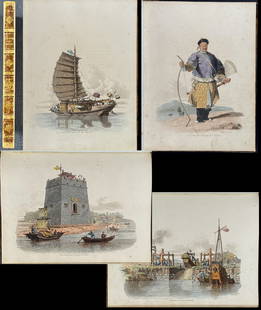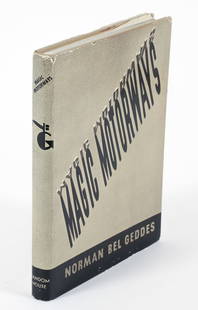
1650 CRITICA SACRAE (Rare) First Print - First Edition
Similar Sale History
View More Items in Books
Related Books

More Items in Books
View MoreRecommended Books, Magazines & Papers
View More









Item Details
Description
Was the Old Testimate Bible text in the Bible accurate ? Cappel's understanding was proved through the discovery of the Dead Sea Scrolls, where the Hebrew did not include vowel points. CRITICA SACRAE (Extremely Rare) FIRST EDITION- FIRST PRINT of IMPORTANT BIBLE WORK of LUDOVICUS CAPELLUS FOLIOIRST EDITION of CAPELLUS IMPORTANT & CONTROVERSIAL WORK on the BIBLE. -Cappel’s important critical study of Scripture, Critica Sacra (1634), met with such theological opposition that he was not able to print it until 1650, at Paris, and then only with the aid of a son who had turned Roman Catholic. The various readings in the Old Testament text and the differences between the ancient versions and the Masoretic text convinced him that the integrity of the Hebrew text, as held by Protestants, was untenable. In particular, he showed that the Hebrew vowel marks could not have been part of the original texts. This amounted to an attack on the verbal inspiration of Scripture. Bitter as was the opposition, however, it was not long before his results were accepted by scholars.
Louis Cappel, Latin Ludovicus Capellus, (born October 15, 1585, Saint-Élier, France—died 1658), French Huguenot theologian and Hebrew scholar.
Cappel studied theology at Sedan and Saumur, both in France, and Arabic at the University of Oxford, where he spent two years in England. In 1613 he accepted the chair of Hebrew at Saumur, and in 1633 he became professor of theology there.
As a Hebrew scholar he made a special study of the history of the Hebrew text, which led him to the conclusion that the vowel points and accents are not an original part of the Hebrew language, but had been inserted by the Massorete Jews of Tiberias, no earlier than the 5th century; he also concluded that the primitive Hebrew characters are those now known as the Samaritan, while the square characters are Aramaic and were substituted for the more ancient at the time of the captivity. These conclusions, published anonymously in his book Arcanum punctuationis revelatum (Leiden, 1624), were hotly contested by Johannes Buxtorf II, since they conflicted with those of his father, Johannes Buxtorf senior; Elias Levita had already disputed the antiquity of the vowel points, with which neither Jeromenor the Talmud showed any acquaintance. Eighteenth-century theologian John Gill in his writing, A Dissertation Concerning the Antiquity of the Hebrew Language, Letters, Vowel-Points and Accents,[1] disputed the idea that the vowel points were invented by the Masorites, and claimed that Hebrew authorities removed the vowel points because of their rejection of Jesus as the Messiah.[2] Gill shows that the name Jehovah is documented from before 200 B.C. throughout the centuries of Jewish Authorities, the early Church and the following millennium.[1] He argued that throughout this history the Masorites did not invent the vowel points and accents, but that they were delivered to Moses by God at Sinai, citing Karaite authorities[3] Mordechai ben Nisan Kukizov (1699) and his associates, who stated that "all our wise men with one mouth affirm and profess that the whole law was pointed and accented, as it came out of the hands of Moses, the man of God,"[3][4][5] The argument of the Karaites shows that some copies have always been pointed and some copies were not pointed with the vowels, especially those copies in Synagogues which Gill talks about.[6] Gill claims that various early sources support the pronunciation of Jehovah, including:[1][7]
- Saadiah Gaon - 927 AD [8]
- Jerome - 380 AD [9]
- Origen - 250 AD [10]
- Zohar - 120 AD [11]
- Josephus - 70 AD [12]
- Demetrius Phalereus, librarian for Ptolemy II Philadelphus king of Egypt- 277 BC[13]
Rare 1st Edition Illustrated Binding: Leather, Language: Latin, Author: Louis Cappel (Ludovicus Capellus), Publisher: Lutetia Parisiorum
*****A Must Have if You Collect Books about History and Christianity*****
These books are extremely scarce and will soon be lost from the journals of time!
Condition
Half Leather binding in nice condition. Solidly bound. Pages in nice condition with browning. Text block overall tight.Large book. Lacking title page, but otherwise appears complete.Pages have some browning, with some scattered light spotting and foxing to some areas,
Year Printed: 1650Large Folio Leather, Binding Half Leather.
DIMENSIONS: 13 1/2" x 9".Good Bind, Very Good Condition
Buyer's Premium
- 20% up to $500.00
- 10% up to $1,000.00
- 5% above $1,000.00
1650 CRITICA SACRAE (Rare) First Print - First Edition
Shipping & Pickup Options
Item located in Powhatan, VA, usPayment










































![1520 PHYSICS POST-INCUNABLE antique VELLUM Jandon commentaries on Aristotle RARE: John of Jandun. Jandon super physica. Questiones subtilissime Joha [n] nis de Ga [n] daho sumi Averrroyste in octo libros Aristotelis de physico auditu p [er] recognitionem vp Joa [n] nis Romberch Kyr](https://p1.liveauctioneers.com/5584/328415/176935424_1_x.jpg?height=310&quality=70&version=1715112425)










![19 issues of rare Gay Magazine METRA 1985-1986: [Queer interest], Metra: Midwest America's Leading Free Gay Magazine, 19 issues, published 1986-1987, a few duplicates, softcover, staplebound wraps, illustrated throughout in black and white, publish](https://p1.liveauctioneers.com/184/328649/177016396_1_x.jpg?height=310&quality=70&version=1714770323)





















